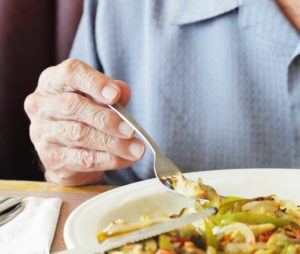Top 5 Signs of Malnourishment in Seniors

Good nutrition is essential to good health, but many seniors are at risk of malnutrition. Factors such as depression, limited social interaction, and even illnesses such as Alzheimer’s can reduce seniors’ ability or desire to get the nutrition they need. Malnutrition can occur when a senior doesn’t get enough nutrients or the balanced diet they need. Either way, malnutrition in seniors is a dangerous condition, especially for seniors.
Is a parent or loved one in your life suffering from malnourishment? Be on the watch for these signs of malnourishment.
Top Five Signs of Malnourishment in Seniors
You may notice the five following signs of senior malnourishment.
[pro_ad_display_adzone id=”5158″]
Loss of Interest in Cooking
Has your loved one lost interest in cooking? Are meals becoming simpler and lacking nutritional balance? Cooking can become more difficult as we age, but if your loved one has experienced a sudden change in their interest or willingness to cook, it may indicate the beginning of malnourishment issues.
Weight Loss
Seniors who are malnourished will typically exhibit weight loss. Your loved one’s appearance may change, and you may notice an unusual body fat loss or condition.
Breathing Problems
Malnutrition can cause breathing problems, particularly breathing difficulty or shortness of breath for seniors. Breathing problems can result from anemia if a senior doesn’t get enough iron and vitamin B12 through their diet.
Depression
Seniors who are malnourished may display symptoms of depression, too. Depression can further contribute to malnutrition since seniors may lose their appetites or not feel like preparing food.
Fatigue
Fatigue is another common symptom of malnutrition. Seniors may spend more time sleeping and experience a general lack of energy.
The Problem With Malnutrition in Seniors
Not only is malnutrition bad for a senior’s health, but it can cause other health issues which are particularly dangerous for seniors. A senior who is malnourished may experience slower wound healing, muscle weakness that can contribute to their risk for falling, and even a weakened immune system that may leave them susceptible to infections and illnesses.
Solutions to Malnutrition in Seniors
A senior who is malnourished needs to be evaluated by a doctor. A doctor may recommend specific diets, vitamins, or other measures to meet the senior’s nutritional needs.
If your parent or loved one has been living alone, you may need to implement strategies to monitor their daily eating habits. Consider stopping by for meals or preparing meals ahead of time.
Home care is a great way to ensure your loved one’s nutritional needs are met when you can’t be there yourself. Caregivers can assist with meal preparation and can be present to help monitor a senior’s eating habits.
Malnutrition is a serious risk to your loved one’s health and should never be ignored. Please contact Cahoon Care today; we’d be happy to discuss how caregiving can help your loved one.
[pro_ad_display_adzone id=”5159″]
